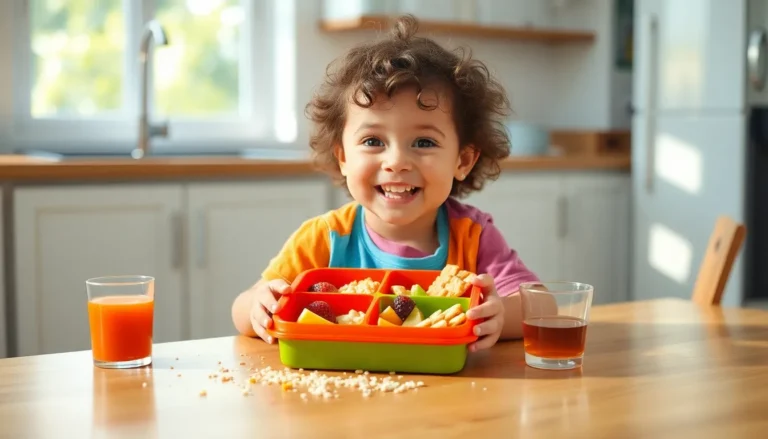Table of Contents
ToggleNavigating the world of toddler meals can feel like a culinary circus act. One minute, they’re loving broccoli, and the next, it’s a full-blown food revolt. A well-structured weekly meal plan can be a game changer, transforming mealtime chaos into a delightful dining experience.
Importance Of A Weekly Meal Plan For Toddlers
A weekly meal plan provides structure for toddlers’ meals. Such planning ensures balanced nutrition throughout the week. Nutrient-rich foods support healthy growth and development, which is crucial during these formative years.
Planning meals in advance reduces stress for caregivers. Less time spent worrying about what to prepare translates into a more enjoyable mealtime atmosphere. Caregivers can focus on engaging with toddlers, enhancing their eating experience.
Incorporating variety prevents boredom. Regularly changing meals encourages toddlers to try new foods, broadening their palate. This practice introduces essential vitamins and minerals that support cognitive and physical development.
Establishing routines helps reinforce positive eating habits. Frequent exposure to different food groups assists toddlers in understanding the importance of nutrition. Understanding prevents picky eating tendencies from developing.
Meal planning also minimizes food waste. Shopping for specific ingredients helps utilize items before they spoil. Using ingredients creatively across multiple meals can also be helpful.
Finally, a weekly meal plan fosters healthy family dynamics. Sharing meals cultivates a sense of togetherness and security. Engaging toddlers in meal selection promotes their autonomy and interest in food.
Key Nutritional Needs For Toddlers

Toddlers require specific nutrients for their overall health and development. Understanding their distinct needs helps caregivers create effective meal plans.
Essential Food Groups
Fruits and vegetables provide essential vitamins and minerals that support immune health. Whole grains, like oats and brown rice, offer necessary fiber and energy. Protein sources, such as lean meats, fish, eggs, and beans, promote muscle growth and development. Dairy products, including milk, yogurt, and cheese, deliver calcium for strong bones. Including healthy fats from avocados and nuts supports brain development. Balance across these food groups encourages a nutritious diet and fosters healthy eating habits.
Portion Sizes
Portion sizes significantly impact toddlers’ nutrition and acceptance of various foods. On average, a serving of fruits or vegetables should be about a quarter cup. Grains can range from a quarter to half cup depending on the food type. Protein portions average between one to two ounces. Dairy servings typically include half cup of milk or yogurt. Adjusting portions based on toddlers’ appetite helps prevent waste and encourages positive experiences at mealtime. Caregivers should observe toddlers’ hunger cues, ensuring adequate nutrition while avoiding overeating.
Sample Weekly Meal Plan For Toddlers
A well-balanced meal plan provides essential nutrition for toddlers. Below is a sample weekly meal plan, offering diverse options for meals throughout the week.
Breakfast Ideas
- Oatmeal topped with fresh berries and a drizzle of honey.
- Scrambled eggs served with whole grain toast and avocado slices.
- Greek yogurt mixed with banana and a sprinkle of cinnamon.
- Whole wheat pancakes paired with sliced strawberries and a light syrup.
- Smoothies made with spinach, banana, and almond milk for a nutrient boost.
- Cottage cheese with pineapple or peaches to introduce different textures.
Lunch Suggestions
- Grilled cheese sandwiches made with whole grain bread and sliced tomatoes.
- Quinoa salad featuring diced cucumbers, cherry tomatoes, and feta cheese.
- Turkey and cheese rolls served with carrot sticks and hummus for dipping.
- Vegetable soup accompanied by whole grain crackers for crunch.
- Peanut butter and banana wraps made with whole wheat tortillas.
- Simple pasta salad with diced bell peppers and olives for a colorful touch.
Dinner Choices
- Baked chicken breasts served with steamed broccoli and brown rice.
- Homemade veggie burgers topped with lettuce and sliced pickles.
- Fish sticks made from baked cod, paired with sweet potato fries.
- Stir-fried tofu with mixed vegetables over quinoa for a protein-rich meal.
- Beef or turkey meatballs served with whole wheat spaghetti and marinara sauce.
- Stuffed bell peppers filled with rice, beans, and spinach for a hearty dinner.
Tips For Successful Meal Planning
Successful meal planning fosters positive eating habits in toddlers. Utilizing smart strategies enhances the overall dining experience.
Involving Your Toddler
Encouraging toddlers in the meal planning process makes them more interested in food. Involve them by allowing choices between fruits or vegetables to create excitement. Letting toddlers help with simple tasks, such as washing produce, builds their confidence. Creating a colorful and fun menu engages toddlers’ attention and encourages them to try new foods. Offering praise for their selections reinforces positive behavior and curiosity about different flavors.
Preparing Meals Ahead
Preparing meals ahead offers convenience and reduces stress during busy days. Cook bulk meals on weekends, then freeze portions for use throughout the week. Utilize containers that are toddler-friendly to make mealtime easier. Pre-chopping fruits and vegetables saves time and encourages quick, nutritious snack options. Planning meals together allows caregivers to maintain variety while ensuring adequate nutrition. Using a consistent schedule for meal preparation leads to a smoother routine.
A well-structured weekly meal plan can transform mealtimes for toddlers and their caregivers. By focusing on balanced nutrition and incorporating variety, caregivers can help toddlers develop healthy eating habits that last a lifetime. Involving toddlers in meal selection not only sparks their interest in food but also fosters a sense of independence.
With careful planning and preparation, mealtimes can become enjoyable experiences filled with nutritious choices. This approach not only supports toddlers’ growth and development but also strengthens family bonds through shared meals. Embracing these strategies can lead to a more positive and stress-free dining atmosphere for everyone involved.




